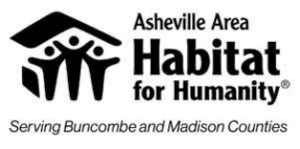

Community Practice Lab (CPL) Primary Lead Dr. Ryan Lavalley and Lead Housing Fellow Leiha Edmonds worked with the Asheville Area Habitat for Humanity in a day-long workshop to support their developing home repair collaborative. Participants mapped out partnership roles, explored questions of access and marginalization, and built infrastructure for a home repair network database.
Through homeownership and home repair programs, the Asheville Area Habitat for Humanity helps families in North Carolina’s Buncombe and Madison counties achieve financial stability, maintain self-reliance, and age in place.
Asheville Habitat reached out to the CPL to explore the development of a collaborative database and community organization network, modeled after the Orange County Home Preservation Coalition (OCHPC). Under Lavalley’s leadership and with many local partners, the CPL has supported the coordination and administration of the OCHPC since its 2017 inception.
 “ARCHR (Asheville Regional Coalition for Home Repair) Staff recently met with CPL Staff with the goal to develop a software platform for member organizations,” said Joel Johnson, Asheville Habitat home repair director. “ARCHR plans on continuing the partnership with CPL as we continue to develop the software platform and grow the coalition membership.”
“ARCHR (Asheville Regional Coalition for Home Repair) Staff recently met with CPL Staff with the goal to develop a software platform for member organizations,” said Joel Johnson, Asheville Habitat home repair director. “ARCHR plans on continuing the partnership with CPL as we continue to develop the software platform and grow the coalition membership.”
In the workshop, the CPL team led Asheville Habitat in mapping partnership roles, with focus on goals, criteria, organizational readiness, and work scope as well as attention to marginalized groups who may be absent from the conversation. The CPL team then guided the organization to draft infrastructure for developing database of community homeowners, which will allow Asheville Habitat to measure community needs and impact.
With the database, Asheville Habitat can also identify community members—such as people of color, older adults, veterans, and people with disabilities—who experience barriers to service. This information will enable Asheville Habitat to assess and improve its processes to reach marginalized groups in the Asheville area.
“It was exciting to support Asheville Habitat’s efforts for community collaboration,” said Lavalley. “Housing impacts physical, mental, and community health, and seeing more collaborative models across North Carolina increases access for more populations in need of home repair, weatherization, and home modifications.”